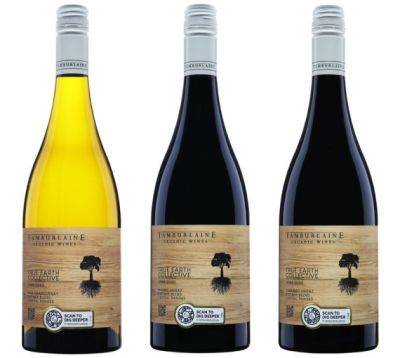Two companies, both based in the APAC region, are offering digital fingerprints which, they claim, are an upgrade to the security currently offered by QR codes. Laava, based in Australia and Cymmetrik, originating from Taiwan, have both developed technologies they have dubbed ‘fingerprinting’,offering enhanced features.
The Laava Smart Fingerprint was featured on Tamburlaine Organic Wines’ 2021. On scanning this allowed consumers to explore the wine’s backstory and connect to micro-investment platform Upstreet to receive shares in a sustainability Exchange Traded Fund, according to a report in Australia’s packaging journal PKN.
The Smart Fingerprint, is an ‘on-bottle’ trust mark which, when scanned and authenticated, activates the secure gateway for customers to connect directly with the Tamburlaine ‘True Earth experience’ – taking them on a journey from vine to wine, and giving them access to exclusive content and promotions. The experiences can continually be upgraded and enhanced in the back-end, so brands get total flexibility and can continue to deepen and change the engagement with customers.
“Each one is as unique as your own fingerprint, therefore every Tamburlaine Wines bottle, all two million of them, has a unique and secure by design,” said Gavin Ger, joint-CEO and commercial director, Laava. “Also, because each one is secure, it makes it usable and perfectly suited as an on-product authentication tool. This can be done with a simple printed mark – it doesn’t need any special inks or special technology. Any digital printer in the world can print them,” Ger says.
“This clever tech, which was developed in collaboration with the Commonwealth Scientific and Industrial Research Organization, means that it actually is the world’s first globally scalable alternative to QR codes, which although they are popular, are actually not suited to secure applications,” he believes. “l tell people it is the upgrade to the QR codes as it matches an image that is fully randomized on the company servers before it unlocks the experience for the consumer.”
Meanwhile Cymmetrik, a label manufacturer within the Greater China Area, has launched its new kind of fingerprint label for anti-counterfeit applications, which, it says, are all completely unique.Unlike other labelling solutions, this new anti-counterfeit design innovates on both aesthetic and technological fronts, combining digital applications with unique graphical designs, according to the company.
Usable on numerous materials, brand owners can generate graphics that embed both product information and unique identification codes(UID). Users can verify product authenticity simply by tilting the label to different angles, revealing hidden patterns and product information. The company has obtained patents for this anti-counterfeittechnology in both China and Taiwan.
The solution is easy-to-implement and enables customizable patterns with no pattern design restrictions. There is no need to set up newsoftware or hardware, making it cost effective, it claims. Product serial numbers and/or barcodes can be hidden as coded information within the packaging pattern, providing striking aesthetics while meeting anti-counterfeiting needs.
A distinctive benefit is that product authenticity can be quickly identified using the naked eye via the distinctivepattern, making the process fast, effective, simple, and convenient, it says.
The technology can be integrated with labels that meet current packaging and anti-counterfeiting requirements, helping to reduce packaging costs. These designs can even be integrated into animation characters, says Cymmetrik.
Packaging 360 is a comprehensive knowledge sharing ecosystem for the Indian packaging industry. Our services include an online content platform to deliver news, insights and case studies; organising conferences seminars and customised training; Providing Bespoke Project Consulting, Market Research and Intelligence.







